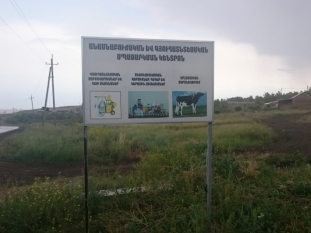Evaluation of Veterinary Service Centers established by CARMAC Project
- Sector:Agriculture, agricultural services and infrastructure
- Services: Monitoring and evaluation
- Period: June 20, 2016-September 20, 2016
- Description:
“Community Agricultural Resource Management and Competitiveness” (CARMAC) Project in Armenia was financed by the World Bank and implemented by the Agriculture PIU under RA Ministry of Agriculture in 2011-2016. The main goal of the Project is to support livestock-oriented mountainous and border communities, where livestock is the main source of livelihood. Under the Project, assistance was provided for the establishment and strengthening of Pasture User Cooperatives, introduction of innovative technologies and improvement of animal breed and animal health measures through veterinary services in the communities.
One of the 4 components of CARMAC Project is “Strengthening Agricultural Support Services”. Under this component, community animal health services were provided, in the scope of which 5 Veterinary Service Centers (VSCs) were established. At the time of conducting the evaluation of the VSCs (July, 2016), 4 VSCs, namely Khndzoresk VSC in Syunik marz, Artashavan VSC in Aragatsotn marz, Tchambarak VSC in Gegharkunik marz and Berd VSC in Tavush marz were operational. The construction of the last VSC in Panik community of Shirak marz was pending.
The findings of the evaluation of the VSCs were later used at the time of the establishment of similar centers, also for the final impact evaluation of the sub-component in the scope of the CARMAC Project Completion Report.
Based on a decision of RA Government, the VSCs established under CARMAC Project were handed over to the “Center for Agribusiness and Rural Development” (CARD) Foundation for an indefinite time and gratuitous use, which already had ample experience in the establishment and operation of similar VSCs.
The activities of the VSC established under CARMAC Project were evaluated based on Artashavan, Khndzoresk and Tchambarak VSCs, which had some operational experience. As recommended by the WB, the VSC in Azatan established by CARD Foundation was also included in the evaluation of the VSCs. The VSC in Azatan was included in the evaluation to compare with the VSCs established by the PIU.
The evaluation of the VSCs was conducted based on the data from 3 sources of information. The aspects that are the subject of the survey are the following as per the sources of information:
- Based on the information collected from the VSCs:
- Geographic service area of the VSCs;
- Scope and the number of the VSCs service users;
- Types of the services provided by the VSCs;
- Development potential of the VSCs;
- Development issues and needs of the VSCs.
- Based on the information collected from rural households using the services of the VSCs:
- Types of the users of the VSCs services and their description;
- Users awareness about the VSCs and the services offered;
- Frequency, regularity and intensity of using the services provided by the VSCs;
- Users satisfaction level with the services provided by the VSCs;
- Need for additional services to receive from the VSCs.
- Based on the information collected from the mayors and veterinarians of the communities located in the geographic service area of the VSCs:
- Number of livestock and its dynamics;
- Health status of agricultural animals;
- Accessibility of veterinary services and medicaments provided by the VSCs and community veterinarians.
The information required for the evaluation of the VSCs was collected from the heads of 3 VSCs (in-depth interviews), 412 rural households of 43 rural communities located in the service area of the VSCs (face-to-face interviews based on a standardized questionnaire), mayors and veterinarians of 15 rural communities (in-depth interviews).







